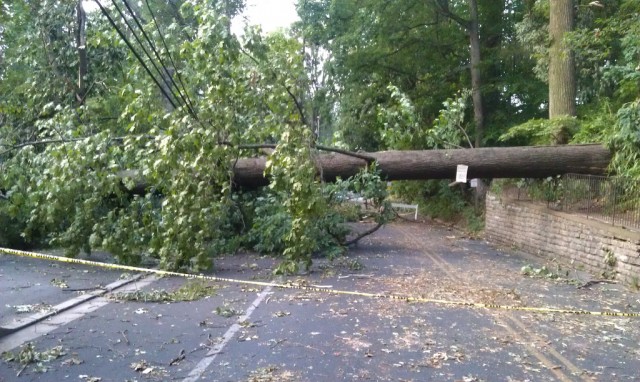
The FCC has released a new report blaming Verizon and Frontier Communications for widespread and largely preventable service outages during a major storm that hit the mid-Atlantic region in June of 2012. After the storm knocked out power grids in parts of Virginia and West Virginia, key generators failed to start, leading to widespread outages in landline phone service. As a result, thousands of 911 calls failed to connect.
The storm, which hit the Washington DC metro area and parts of West Virginia and Ohio, was a "derecho," characterized by strong, straight-line winds. Unlike hurricanes, derechos can crop up suddenly and therefore don't give service providers much time to prepare for them.
Still, the FCC says Verizon did have some warning that its network was not ready for prime time. Unfortunately, it failed to move quickly enough to address the problem. Verizon's records show that two days before the storm hit, a generator in the company's Arlington central office failed a routine reliability test. When the storm hit, the generator failed, leaving the office on battery power which only lasted for a few hours. As a result, the office was without power for about 8 hours on the morning of June 30.
"The failure of backup power at the Arlington central office directly resulted in the loss of 9-1-1 service to residents in northern Virginia, key switching capabilities, and virtually all of Verizon’s network monitoring capabilities in the area," the FCC reports. "These high-impact failures could have been prevented, or at least mitigated," through the use of "best practices and other sound engineering practices."
A Verizon central office in Fairfax, Virginia, suffered a similar fate. The Fairfax office had two different generators that were supposed to power equipment on different floors of the building. But one of them failed, and the battery failed before it could be replaced. Indeed, when a technician arrived on the scene the next morning, he checked the working generator but didn't notice that the other generator had failed for several hours.
Frontier Communications, which operates a telephone network in West Virginia, also suffered outages due to generator failures. But these failures affected fewer people in the sparsely populated state.
Overall, the FCC says that 17 Public Safety Answering Points—the call centers that accept 911 calls—completely lost connectivity due to these network failures. Eleven centers failed in West Virginia, four occurred in Virginia, and 2 in Ohio. Several dozen other call centers suffered from overloaded circuits or other problems.
The report was more positive about how the nation's major wireless carriers handled the storm. "Cell site outage rates during and after the storm varied by provider and jurisdiction, but were modest both in number and duration in comparison to other superstorms or hurricanes," the report said.
In the first two days after the derecho, about 10 percent of cell phone towers in the affected area were unreachable. By the fourth day, the number of outages had declined to about 2 percent. "Impacts on service were not nearly as pervasive as might have been expected, and most outages were rectified relatively quickly," the FCC concluded.
The FCC wants Verizon and other network operators to make their networks more reliable in the face of natural disasters. The commission says that network operators should ensure that central offices have redundant power supplies and that these backup systems be tested regularly and replaced promptly when they fail those tests. It also suggested a greater effort to eliminate single points of failure in the telephone network so that operators can quickly route around failed equipment and keep most of the network operating smoothly.
The FCC's investigation was mostly conducted prior to Superstorm Sandy, which devastated the Northeast in late October. The commission says it expects a future report to examine the "widespread and severe impacts on communications" produced by that natural disaster.
reader comments
39